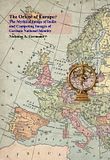Orient of Europe
Germana, Nicholas A.:
The Orient of Europe : the mythical image of India and competing images of German national identity / by Nicholas A. Germana. - Newcastle-upon-Tyne : Cambridge Scholars Publishing, 2009. - 272 S.
ISBN 978-1-4438-0192-8 / 1-4438-0192-5
£ 39,99 / US$ 59,99
DDC: 943.07
Beschreibung
August Wilhelm Schlegel proclaimed that “[i]f the regeneration of the human species started in the East, Germany must be considered the Orient of Europe.” How can this remarkable identification of Germany with the subjugated oriental ‘other’ be explained? In The Orient of Europe, Nicholas A. Germana explores how German thinkers, especially those associated with the Early Romantic movement, set India up as an “ideal mirror,” in which they could perceive the image of the Germany they longed for – a nation whose greatness lay not in political and military power, but in the realm of culture and the spirit. Such an image was especially important during the years of French occupation and the Wars of Liberation against Napoleon.
The ‘mythical image’ of India, however, underwent profound changes in the decades after 1815. The end of the Wars of Liberation and the onset of the Restoration era, led to the decline of the romantic image of India. As statist visions of German unity rose in prominence, especially in Prussia, this image of the connection between Germany and ancient India took on a new complexion. Politically volatile romantic “Indomania” gave way to a new, more acceptable, ideology – the ideology of Wissenschaft.
In this book, which engages with the most recent scholarship in the rapidly emerging field of German Orientalism, Germana challenges traditional Saidian Orientalist readings of German intellectual engagement with Indian thought and literature. German romantic and humanist fascination with India, he argues, is best understood within the context of debates about the nature of ‘Germany’ and ‘Germanness’ in the late eighteenth and early nineteenth centuries, rather than in connection with nascent German “colonial fantasies.” [Verlagsinformation]
Inhalt
Acknowledgments. ix
Introduction. 1
1. Herder’s Morgenland. 18
2. Novalis – The Blue Flower. 61
3. Friedrich Schlegel and The Highest Romanticism. 98
4. Indomania, Teutonomania, and the Creuzerstreit. 131
5. German Diligence and German Profundity. 170
6. Hegel and India: The March of God in the World. 206
Conclusion. 243
Bibliography. 254
Index. 267
Autor
NICHOLAS A. GERMANA is an Assistant Professor of History at Keene State College, in New Hampshire. His publications to date include “Herder’s India: The ‘Morgenland’ in Mythology and Anthropology,” in Anthropology of the Enlightenment (Stanford University Press, 2007). His research focuses on German Romanticism and Idealism, as well as the emergence of German nationalism in the late eighteenth and early nineteenth centuries. Faculty page
Quellen: Cambridge Scholars Publishing; Libris; Amazon; WorldCat; Blackwell Bookshop Online.
Ähnlich
- India and Europe in the Global Eighteenth Century
- India in the Chinese Imagination
- Lardinois: Scholars and Prophets
- Debating Orientalism
- Myers: German Visions of India
- Rabault-Feuerhahn: Archives of Origins
- L'Inde des Lumières
- Yang: Idealbilder - Zerrbilder
- 200 Jahre Indienforschung
- Sir William Jones et la représentation de l'Inde

